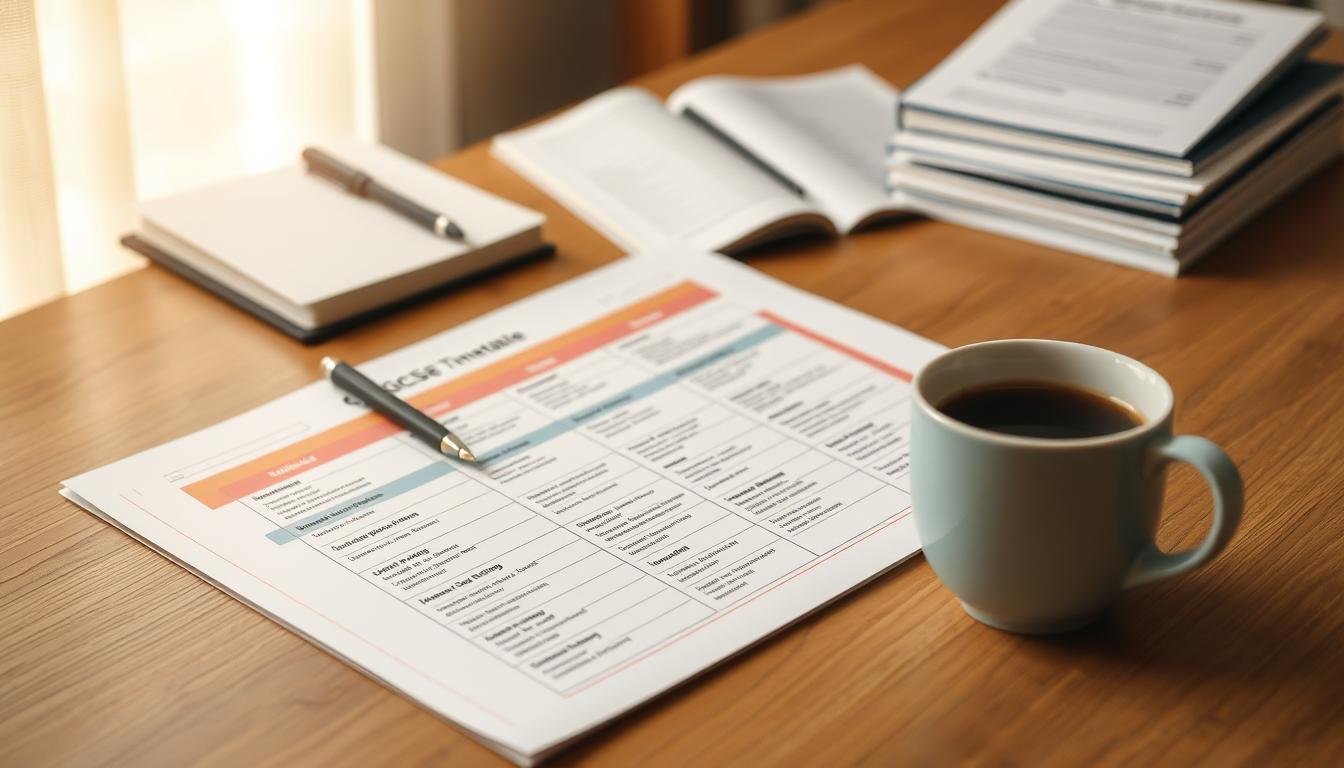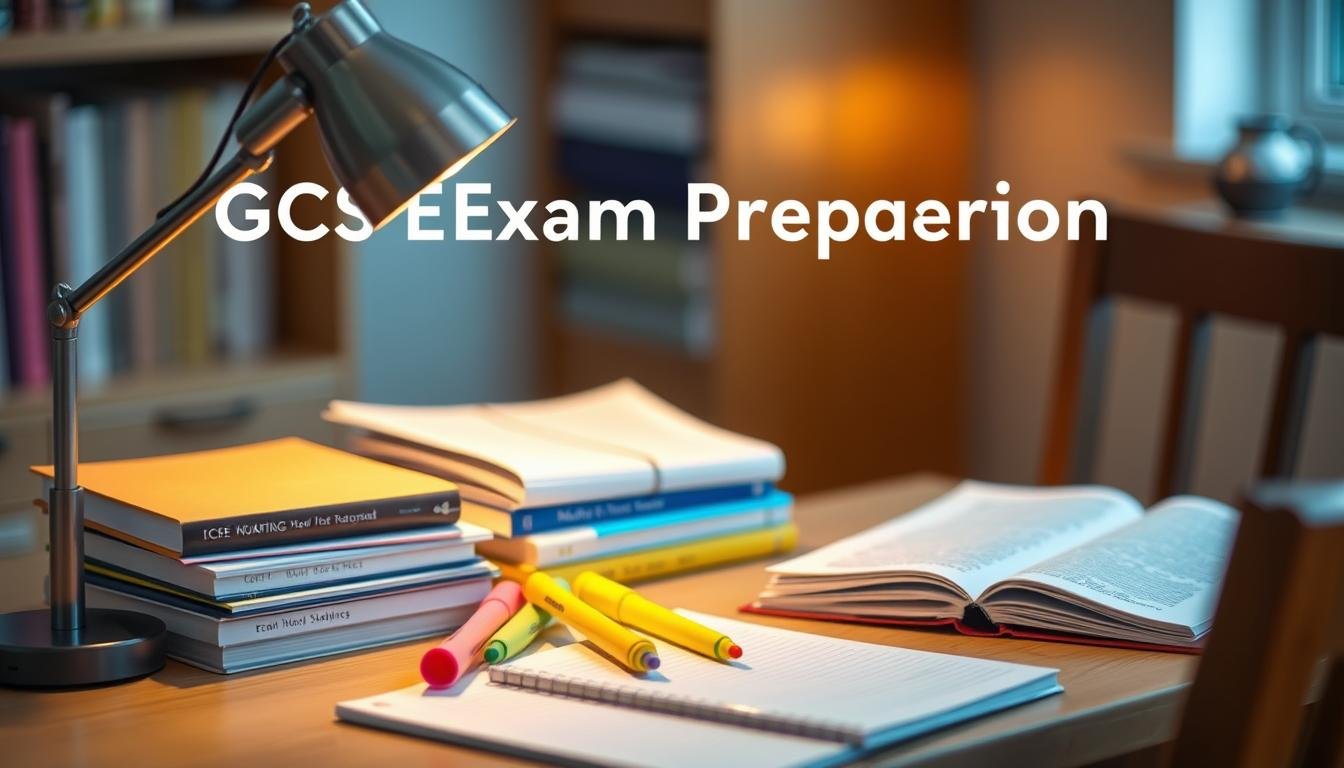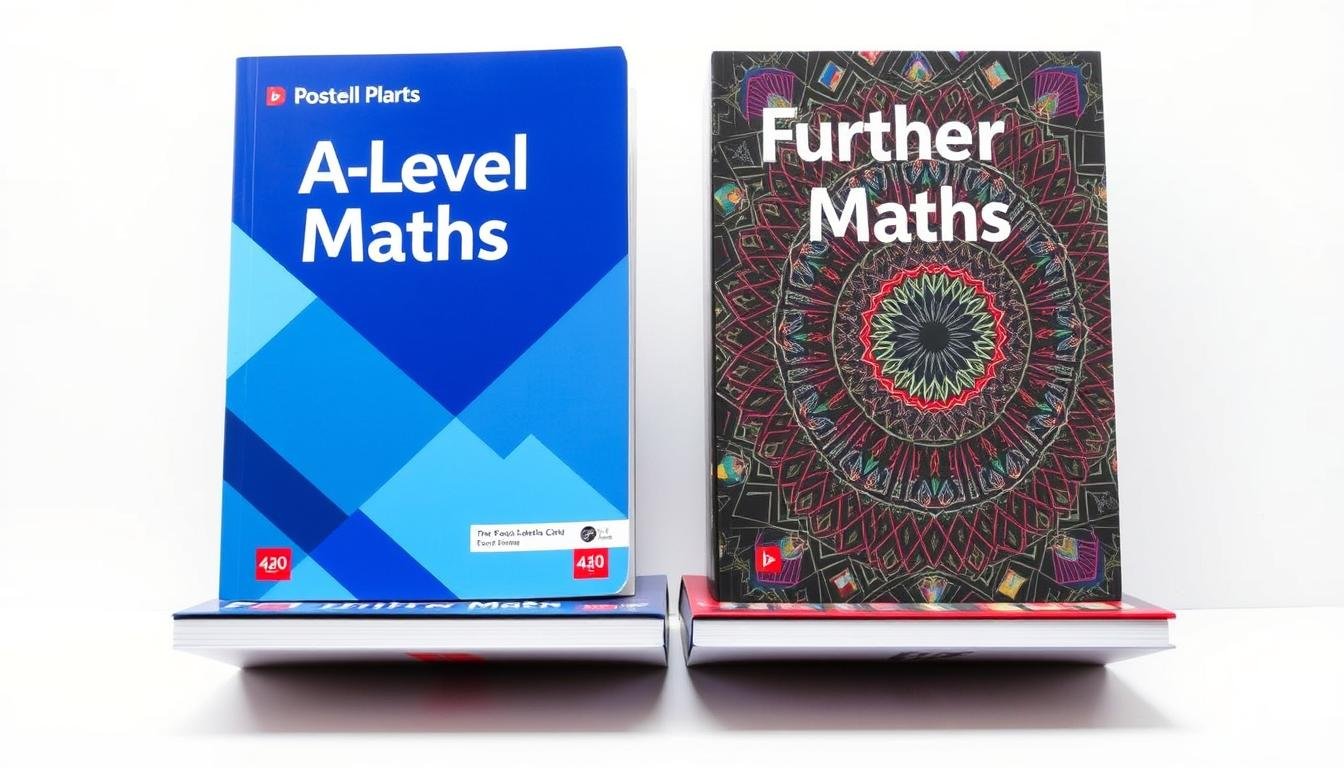Are you getting ready for your GCSE exams? Looking for good study materials? Accessing past papers and mark schemes is key to your study plan.
Using past exam papers helps you get used to the exam style. You learn what questions are asked and how to manage your time. Also, looking at the mark schemes shows you what examiners want to see in your answers. This helps you improve your studying.
Downloading these resources can really boost your exam prep. Our article will show you how to get these helpful study tools.
Key Takeaways
- Access to free GCSE past papers and mark schemes.
- Effective revision strategies using past exam materials.
- Understanding the importance of mark schemes in exam preparation.
- Tips on how to utilise past papers for better exam performance.
- Guidance on accessing these resources for your GCSE exams.
Why GCSE Past Papers Are Essential for Exam Success
Using past papers is a top way to get ready for GCSE exams. They offer lots of useful info and resources. This can really help you understand and do well in the real exams.
Benefits of Using Past Papers in Your Revision Strategy
There are many good reasons to use past papers in your study plan. They show you what the exam is like and the types of questions you’ll face. By practicing with GCSE exam resources, like those from Revision World, you get used to the exam layout and timing.
Also, past papers help you see where you need to improve. By trying different questions, you can find out what you’re good at and what you need to work on. This helps you focus your studying better.
How Mark Schemes Improve Your Understanding
Mark schemes are key for revision materials for GCSE exams. They tell you how examiners score your answers. By looking at mark schemes with past papers, you learn how to answer questions well and avoid mistakes.
This knowledge can really boost your exam skills. For example, mark schemes often point out important terms and ideas for top grades.
Building Confidence and Reducing Exam Anxiety
Practicing with past papers can also make you feel more confident and less anxious about exams. As you get used to the exam style and types of questions, you’ll feel more ready and calm. By preparing for GCSE exams with free materials, like those on Revision World, you can build the confidence to do well.
Plus, the more you practice, the more comfortable you’ll get with the exam’s timing and pressure. This lets you do your best in the exam.
GCSE Past Papers & Mark Schemes: Free Downloads Available
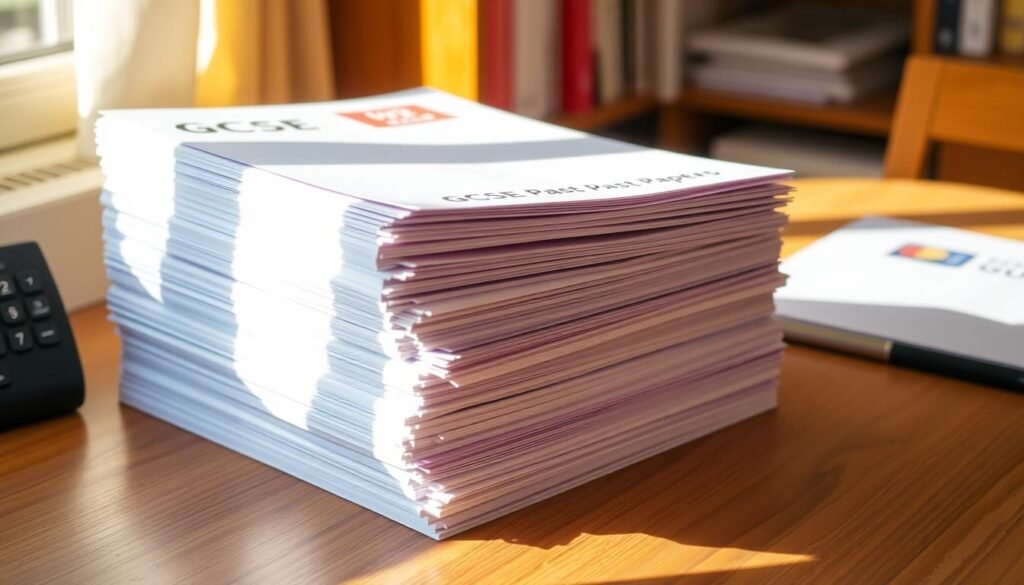
GCSE past papers and mark schemes are key for students aiming high in exams. They offer real questions and detailed mark schemes. This helps you know what examiners look for.
Official Examination Board Resources
Boards like AQA, Edexcel/Pearson, OCR, and WJEC/Eduqas have past papers and mark schemes on their sites. These are up-to-date and match the current curriculum.
AQA Past Papers and Resources
AQA has a wide range of past papers and mark schemes for GCSE subjects. Visit the AQA website to access them.
Edexcel/Pearson Past Papers and Resources
Edexcel/Pearson qualifications have past exam papers and mark schemes for GCSE subjects. Find these on the Pearson qualifications website.
OCR Past Papers and Resources
OCR offers past papers and mark schemes for GCSE subjects. Access these through the OCR website.
WJEC/Eduqas Past Papers and Resources
WJEC/Eduqas also has past papers and mark schemes for GCSE subjects. Visit the WJEC website to find these resources.
Alternative Free Sources for Past Papers
There are other places to find free GCSE past papers and mark schemes, apart from official boards.
School and College Websites
Many schools and colleges post past papers and mark schemes on their websites. Look for these resources on educational institution websites near you.
Educational Resource Platforms
Websites like MyMaths and Seneca Learning have a variety of GCSE resources, including past papers and mark schemes.
Teacher Resource Sharing Sites
Teachers often share resources, like past papers, on platforms like TES and Educate UK.
Revision Websites and Apps
Revision sites and apps, such as BBC Bitesize and Revision World, offer GCSE past papers, mark schemes, and study materials.
Using these resources, you can make a detailed revision plan. This plan should include practicing with past papers and understanding the mark schemes.
| Examination Board | Website | Resources Available |
|---|---|---|
| AQA | AQA Website | Past Papers, Mark Schemes |
| Edexcel/Pearson | Pearson Qualifications | Past Papers, Mark Schemes |
| OCR | OCR Website | Past Papers, Mark Schemes |
| WJEC/Eduqas | WJEC Website | Past Papers, Mark Schemes |
How to Access Past Papers for Different GCSE Subjects
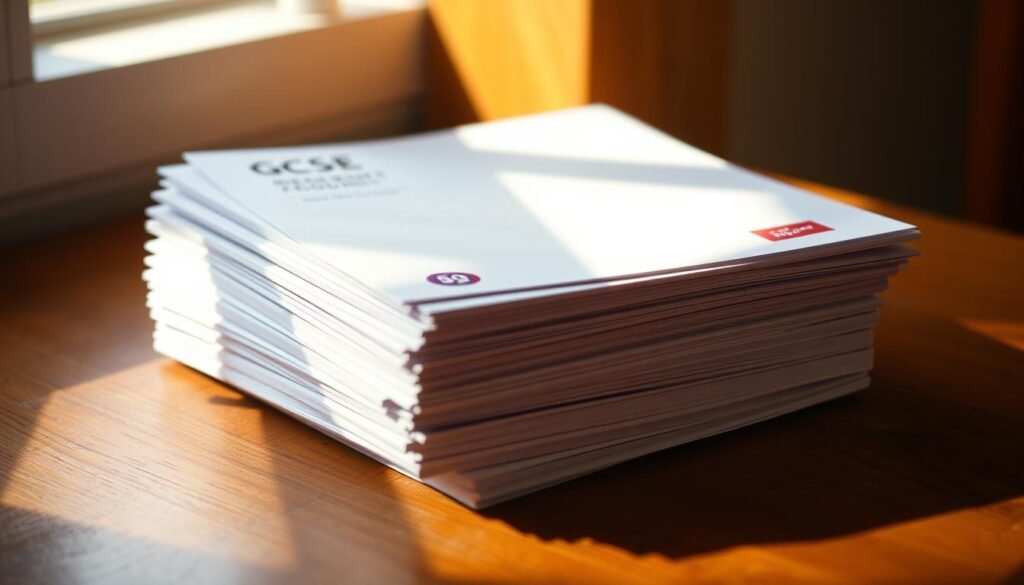
To get ready for your GCSE exams, knowing how to find past papers is key. Past papers give you a peek into the exam style, question types, and how marks are given. Whether you’re studying Maths, English, Science, or other subjects, finding the right past papers is essential.
Core Subjects: Maths, English and Science
Core subjects are at the heart of your GCSE studies. Here’s how to find past papers for these important areas:
Mathematics (Foundation and Higher Tiers)
Maths past papers for Foundation and Higher tiers are on AQA and OCR websites. You’ll get question papers and mark schemes to check your maths skills.
English Language and Literature
English Language and Literature past papers are on Cambridge Assessment. They show you the exam style and types of questions, like comprehension and essays.
Sciences (Combined and Separate)
Science past papers, for Combined and Separate Sciences, are on Edexcel and AQA websites. They’re vital for grasping science’s practical and theoretical sides.
| Subject | Exam Board | Resource Link |
|---|---|---|
| Mathematics | AQA | AQA Maths Past Papers |
| English Language | Cambridge | Cambridge English Past Papers |
| Science | Edexcel | Edexcel Science Past Papers |
Optional Subjects: Humanities, Languages and Creative Arts
Optional subjects let you dive into areas you love. Getting past papers for these subjects boosts your prep.
History, Geography and Religious Studies
For Humanities like History, Geography, and Religious Studies, check AQA and OCR websites. These resources are great for essay questions and mark schemes.
Modern Foreign Languages
Modern Foreign Languages, like French, Spanish, or German, have past papers on Edexcel and Cambridge Assessment websites. They’re key for both written and oral exams.
Art, Design, Music and Technology Subjects
For Creative Arts and Technology, past papers and mark schemes are on AQA and OCR websites. They’re vital for project work and written exams.
Effective Strategies for Using Past Papers in Your Revision
Using past papers in your revision can really help you prepare for GCSE exams. They let you get used to the exam format and find areas to improve. You can also make a better study plan.
Creating a Structured Revision Timetable with Past Papers
To make the most of past papers, plan your revision well. First, list the subjects and topics you need to focus on. Then, assign specific past papers to each study session. For example, use Mondays for Maths and Wednesdays for Science. Consistency is key to improving and keeping information.
- Identify key subjects and topics that require attention.
- Allocate specific past papers to each study session.
- Set realistic goals for completing each paper.
- Review your performance and adjust your timetable as needed.
Techniques for Self-Assessment Using Mark Schemes
Mark schemes are very useful for checking your work. By comparing your answers to the mark scheme, you can see where you went wrong. Pay particular attention to the language used in the mark schemes, as it shows what examiners want.
- Complete a past paper under timed conditions.
- Mark your work using the mark scheme.
- Analyse your mistakes to identify patterns or common errors.
- Adjust your revision plan to focus on weak areas.
Working with Study Groups on Past Paper Questions
Working with others can make revision more fun. Join a study group to tackle past paper questions together. You can share knowledge, discuss tricky topics, and learn from each other’s strengths and weaknesses. Active participation in study groups can really boost your confidence and understanding.
- Find classmates or friends to form a study group.
- Choose a past paper to work on together.
- Discuss answers and mark schemes as a group.
- Share resources and tips for tackling difficult questions.
Understanding and Interpreting GCSE Mark Schemes
Learning to read GCSE mark schemes is key to doing well in exams. It’s important to know the language examiners use, understand the types of questions, and how grades are set. This knowledge helps you prepare better.
Decoding Examiner Language and Terminology
Examiner language can be tricky, filled with special terms. Key terms like “analyse,” “compare,” and “evaluate” are important. Knowing these helps you answer questions as the examiners want.
For example, “analyse” means breaking down information and explaining its importance. This shows you understand the topic well.
Identifying Different Types of Questions and Expected Answers
GCSE exams have many question types, each needing a different answer. Multiple-choice questions ask you to pick the right answer from options. Essay questions need you to write a detailed argument.
Knowing the question type helps you plan your answer. Mark schemes show you what answers are correct. This helps you understand what’s expected.
| Question Type | Expected Answer | Marks Allocation |
|---|---|---|
| Multiple Choice | Correct option selected | 1 mark |
| Short Answer | Brief, accurate response | 2-3 marks |
| Essay | Detailed, well-structured argument | 10-15 marks |
Recognising Grade Boundaries and What They Mean
Grade boundaries show the minimum marks for each grade. Knowing these helps you set goals. For instance, aiming for a Grade 7 means you know how many marks you need.
Grade boundaries are on official exam board websites. They’re with past papers and mark schemes. By understanding GCSE mark schemes, you can do better in exams. Use past exam papers with mark schemes and study materials for GCSE students to improve your revision.
Conclusion: Maximising Your GCSE Results with Past Papers
GCSE past papers and mark schemes are key to your exam prep. Using them well can really boost your grades. You can find free GCSE past papers from official sites and other places, helping you get ready for your exams.
Plan your study time well, focusing on past papers and mark schemes. This method boosts your confidence and lessens exam stress. It also helps you understand the exam format better. Use all the resources you can to get better at your exams today.
FAQ
Where can I find free GCSE past papers and mark schemes?
You can find free GCSE past papers and mark schemes on official websites. Look at AQA, Edexcel/Pearson, OCR, and WJEC/Eduqas. You can also find them on school websites and revision apps.
How do I access past papers for specific GCSE subjects?
To find past papers for specific GCSE subjects, go to the relevant board’s website. Look for the subject area. School websites and revision apps also have subject-specific papers.
What are the benefits of using GCSE past papers in my revision?
Using GCSE past papers helps you understand the exam format. It shows you where to improve and boosts your confidence. It also makes you familiar with the types of questions and marking schemes.
How do I use mark schemes effectively to improve my exam performance?
To use mark schemes well, learn the examiner’s language. Know the different question types and grade boundaries. This helps you understand what examiners want and improves your answers.
Can I use past papers to create a structured revision timetable?
Yes, you can use past papers to plan your revision. Identify what you need to focus on and set aside time for each area.
Are there any alternative sources for GCSE past papers beside official boards?
Yes, you can find GCSE past papers on school websites, revision apps, and online study resources. But make sure these sources are authentic.
How can I use past papers to work with study groups?
Use past papers to work with study groups by sharing questions and discussing answers. Comparing mark schemes helps everyone learn and stay motivated.
What are the benefits of self-assessment using mark schemes?
Self-assessment with mark schemes helps you see where you need to improve. It also helps you understand the marking criteria better. This way, you can refine your answers to get higher marks.

